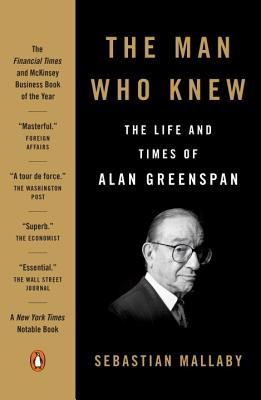

 Penguin Books
Penguin Books
The Man Who Knew: The Life and Times of Alan Greenspan


Key Metrics
- Sebastian Mallaby
- Penguin Books
- Paperback
- 9780143111092
- 8.4 X 5.5 X 1.8 inches
- 1.4 pounds
- Biography & Autobiography > Political
- English
 Secure Transaction
Secure TransactionBook Description
Sebastian Mallaby's magisterial biography of Alan Greenspan, the product of over five years of research based on untrammeled access to his subject and his closest professional and personal intimates, brings into vivid focus the mysterious point where the government and the economy meet. To understand Greenspan's story is to see the economic and political landscape of the last 30 years--and the presidency from Reagan to George W. Bush--in a whole new light. As the most influential economic statesman of his age, Greenspan spent a lifetime grappling with a momentous shift: the transformation of finance from the fixed and regulated system of the post-war era to the free-for-all of the past quarter century. The story of Greenspan is also the story of the making of modern finance, for good and for ill.
Greenspan's life is a quintessential American success story: raised by a single mother in the Jewish �migr� community of Washington Heights, he was a math prodigy who found a niche as a stats-crunching consultant. A master at explaining the economic weather to captains of industry, he translated that skill into advising Richard Nixon in his 1968 campaign. This led to a perch on the White House Council of Economic Advisers, and then to a dazzling array of business and government roles, from which the path to the Fed was relatively clear. A fire-breathing libertarian and disciple of Ayn Rand in his youth who once called the Fed's creation a historic mistake, Mallaby shows how Greenspan reinvented himself as a pragmatist once in power. In his analysis, and in his core mission of keeping inflation in check, he was a maestro indeed, and hailed as such. At his retirement in 2006, he was lauded as the age's necessary man, the veritable God in the machine, the global economy's avatar. His memoirs sold for record sums to publishers around the world.
But then came 2008. Mallaby's story lands with both feet on the great crash which did so much to damage Alan Greenspan's reputation. Mallaby argues that the conventional wisdom is off base: Greenspan wasn't a na�ve ideologue who believed greater regulation was unnecessary. He had pressed for greater regulation of some key areas of finance over the years, and had gotten nowhere. To argue that he didn't know the risks in irrational markets is to miss the point. He knew more than almost anyone; the question is why he didn't act, and whether anyone else could or would have. A close reading of Greenspan's life provides fascinating answers to these questions, answers whose lessons we would do well to heed. Because perhaps Mallaby's greatest lesson is that economic statesmanship, like political statesmanship, is the art of the possible. The Man Who Knew is a searching reckoning with what exactly comprised the art, and the possible, in the career of Alan Greenspan.
Author Bio
Sebastian Mallaby is the Paul A. Volcker senior fellow for international economics at the Council on Foreign Relations (CFR). An experienced journalist and public speaker, Mallaby is also a contributing columnist for the Washington Post, where he previously served as a staff columnist and editorial board member. He is the author of The Man Who Knew: The Life & Times of Alan Greenspan, winner of the 2016 Financial Times/McKinsey Business Book of the Year Award and the 2017 George S. Eccles Prize in Economic Writing. His writing has also appeared in the Atlantic and the Financial Times, where he spent two years as a contributing editor.
Mallaby’s interests cover a wide variety of domestic and international issues, including central banks, financial markets, the implications of the rise of newly emerging powers, and the intersection of economics and international relations. His previous book, More Money Than God: Hedge Funds and the Making of a New Elite, was described by New York Times columnist David Brooks as “superb”; it was the recipient of the 2011 Loeb Prize and a New York Times bestseller. His earlier works are The World’s Banker, a portrait of the World Bank under James Wolfensohn that was named as an “Editor’s Choice” by the New York Times; and After Apartheid, which was named by the New York Times as a “Notable Book.” An essay in the Financial Times said of The World’s Banker, “Mallaby’s book may well be the most hilarious depiction of a big organization and its controversial boss since Michael Lewis’s Liar’s Poker.”
Before joining the Washington Post in 1999, Mallaby spent thirteen years with the Economist. While at the Economist, he worked in London, where he wrote about foreign policy and international finance; in Africa, where he covered Nelson Mandela’s release and the collapse of apartheid; and in Japan, where he covered the breakdown of the country’s political and economic consensus. Between 1997 and 1999, Mallaby was the Economist’s Washington bureau chief and wrote the magazine’s weekly Lexington column on American politics and foreign policy. He is a two-time Pulitzer Prize finalist: once for editorials on Darfur and once for a series on economic inequality. In 2015, he helped to found a startup, InFacts.org, a web publication making the fact-based case for Britain to remain in the European Union.
Mallaby was educated at Oxford, graduating in 1986 with a first class degree in modern history. After eighteen years in Washington, DC, he moved to London in 2014, where he lives with his wife, Zanny Minton Beddoes, editor in chief of the Economist.
Source: Council on Foreign Relations
Videos
No Videos
Community reviews
Write a ReviewNo Community reviews